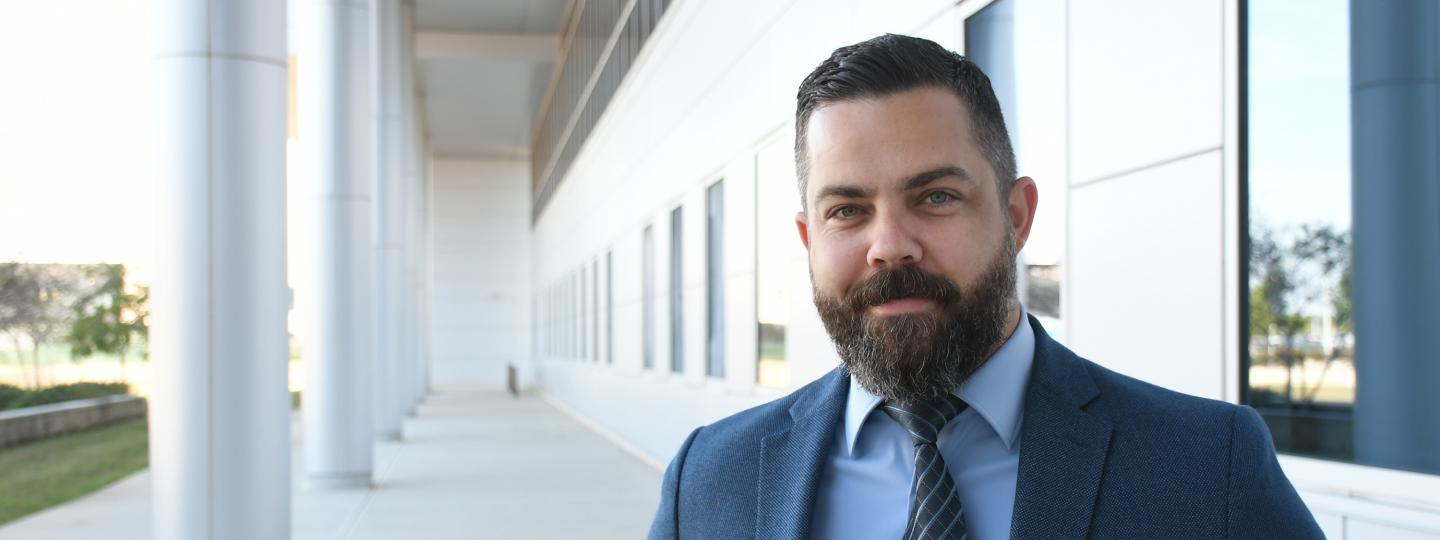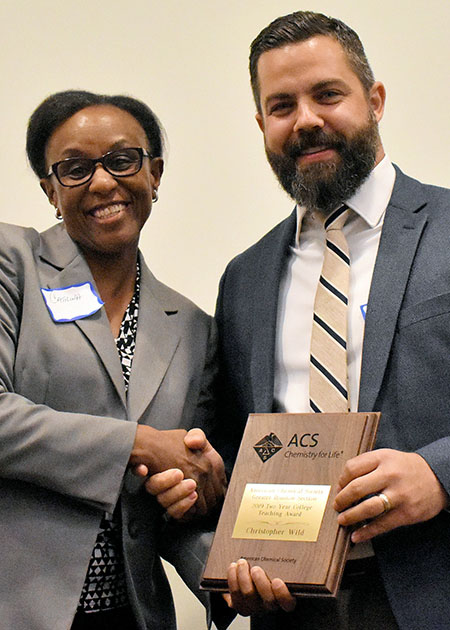A Wild' guess Chemistry award goes to physical science department chair

"If not you, then who?"
This question, posed by his organic chemistry professor, changed everything for Dr. Christopher Wild.
Despite being intimidated by the bubbling concoctions and baffling contraptions in his university's research lab, he edged into undergraduate research and got hooked.
Today, no longer a directionless first-generation college student, Wild not only serves as the San Jacinto College South Campus department chair of physical science and engineering but also boasts a robust resume of accomplishments.
This fall, thanks to his engaging teaching and vision for community college undergraduate research, he won the American Chemical Society Greater Houston Section 2019 Two-Year College Award.
"You do what you do because you love doing it," he said. "When these awards happen, you have tremendous gratitude, but you're tremendously humbled because it's a team effort involving hard-working faculty and supportive administrators."
He numbers among five San Jacinto College chemistry teachers to have received this award in the past 10 years.
Research Advocate
Central Campus distinguished professor of chemistry Dr. Ann Cartwright, who helped nominate Wild for the award, originally hired him as an adjunct faculty member in 2008.
"Chris is so charismatic in the classroom that you want to enroll in another course from him immediately," Cartwright said. "Even though we are now on different campuses, he never ceases to amaze me with his enthusiasm and fresh ideas."
Ever the researcher, Wild earned his doctorate in a medicinal chemistry lab while teaching full time at San Jacinto College. He works with the University of Texas Medical Branch Center for Addiction Research and, in four years, has published 18 peer-reviewed articles about cancer and central nervous system disorders.
Passionate about science education, he not only helps review National Science Foundation grant applications but also writes grants to fund student research opportunities.
In addition to encouraging students to pursue experiences like the University of Iowa Cancer Research Program and Rice University summer internships, he established the South Campus Undergraduate Research Center two years ago. This center awakens students to STEM professional opportunities and levels the playing field with peers who network earlier at four-year institutions.
"One gap that exists at community college for any student who is thinking about a career in scientific research or medicine is research experience for their resume," Wild said. "The undergraduate research here gives them skills they can leverage to secure additional undergraduate research opportunities when they transfer."
In the center's dedicated lab space, South Campus faculty members mentor students in higher-level projects. Each spring, these students present at an on-campus undergraduate research symposium and poster session. Some even pursue national conferences.
Undergraduate research opens many doors, not only enhancing students' resumes but also sparking their interest in graduate studies.
Teacher at Heart
These days, as a department chair, Wild spends more time "teaching by extension," supporting physical science and engineering faculty. But in the summer, when he dons his organic chemistry professor hat, he enjoys motivating students to problem solve, think critically, and strategize.
"One of the biggest challenges is reinvigorating students' desire to question things — the capacity to solve problems on their own," he said. "There are unanswered questions in every profession. When they get to the workplace, will they be the go-to person to solve problems?"
What he expects of students — quality work — he also requires of himself. No phoning it in here.
"Students are hungry to learn, and they expect quality instruction," he said. "You have to remember you're impacting their lives."
From hesitant undergrad to award-winning faculty member, Wild credits his success to many colleagues and mentors along the way, especially the professor who originally challenged him: "If not you, then who? If you don't do this, who will?"

